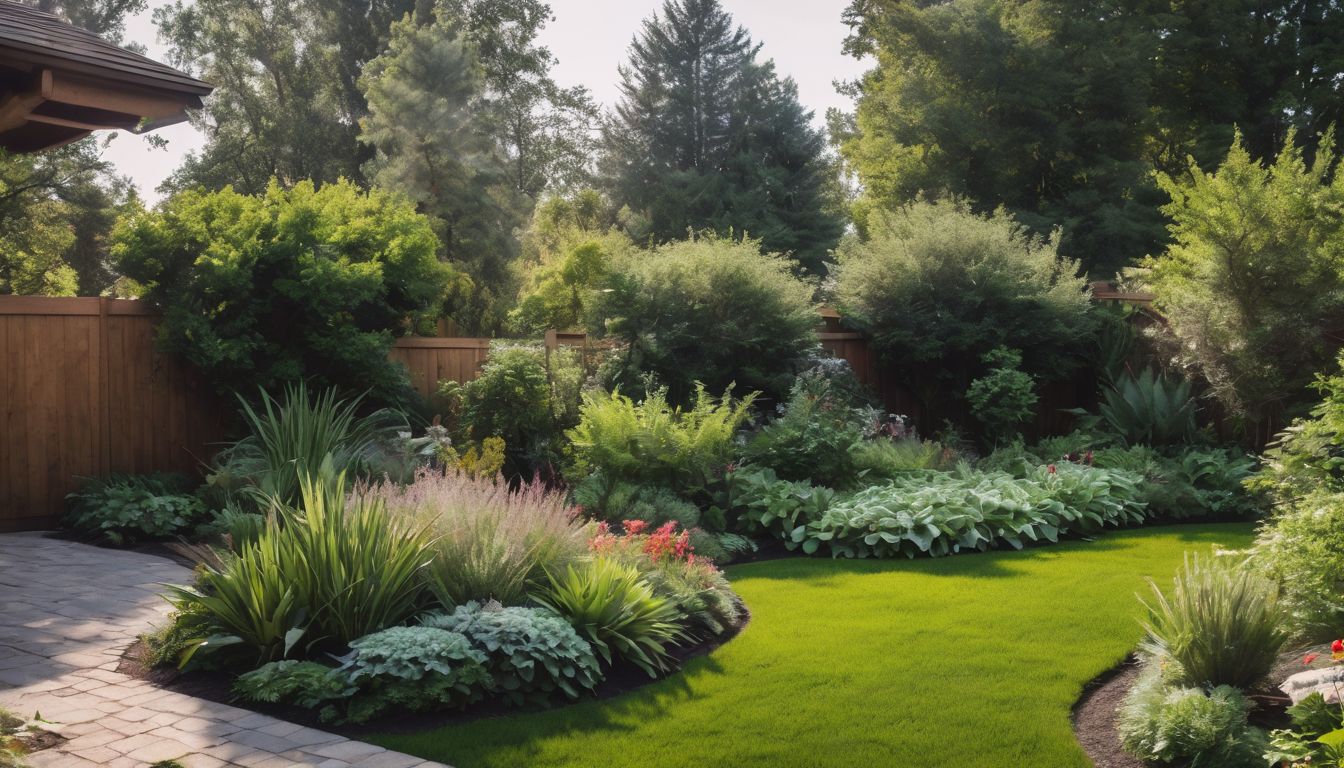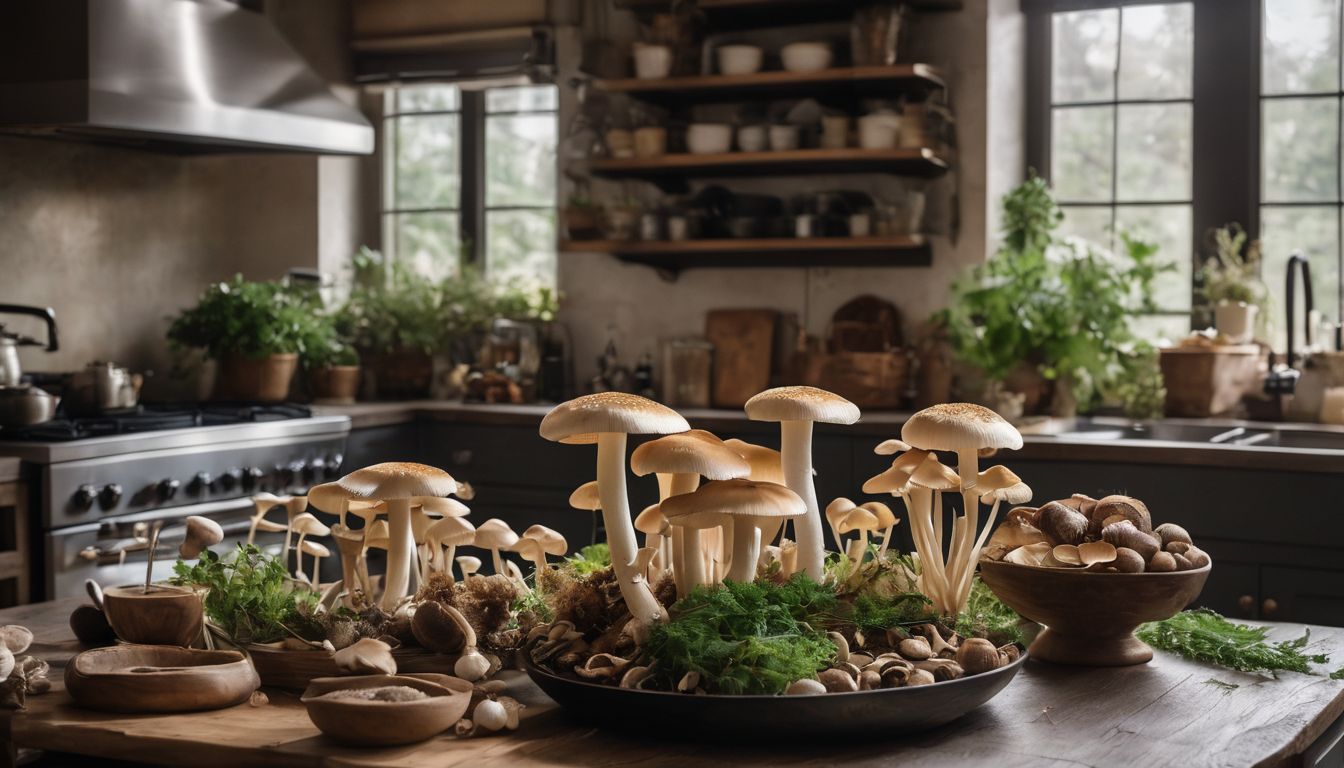Struggling with poor garden soil that won’t support healthy plant growth? Compost is nature’s own nutrient-rich soil enhancer, teeming with beneficial microorganisms. This article will guide you through the ins and outs of composting to revitalise your garden naturally.
Let’s dig in and get growing!
Key Takeaways
- Composting turns kitchen and yard waste into nutrient – rich soil, eliminating the need for chemical fertilisers and saving money.
- It encourages the growth of beneficial microorganisms in the soil, which helps plants become more disease-resistant and robust.
- Using compost can improve water retention in the garden, reducing runoff during heavy rain and conserving water.
- By diverting organic material from landfills through home composting, methane emissions decrease, helping to combat climate change.
- Home composting provides economic benefits by lowering gardening costs associated with fertilisers, pesticides, irrigation, and soil erosion management.
What is Compost and its Benefits for Garden Soil?
Compost is a mixture of decayed organic matter that improves soil structure and fertility, increases microorganisms in the soil, adds nutrients to the soil, helps amend hard-packed or sandy soil and can eliminate the need for chemical fertilisers.
It also aids in soil erosion prevention.
Improves soil structure and fertility
Composting works wonders in creating a crumbly, nutrient-rich soil that plants thrive in. It introduces organic matter that breaks down over time, providing a steady supply of food to the microorganisms your garden depends on.
These beneficial bacteria and fungi transform dead materials into valuable nutrients, which leads to fertile ground where plant roots spread easily.
Adding compost improves water retention in sandy soils and helps dense clay soils drain better. This balance is crucial for healthy plant growth and reducing the risk of root diseases.
With this natural boost, your garden’s soil becomes an engine for sustainability, cycling nutrients effectively and keeping your plants strong without relying on chemical fertilisers.
By integrating compost into your gardening routine, you’re not just enriching the earth; you’re laying the groundwork for robust macronutrient increase and pest control. The rich life below the surface creates a foundation for above-ground vitality—stronger stems, greener leaves, and more vibrant blooms show that what you put into your soil comes back tenfold in beauty and yield.
Increases microorganisms in soil
Composting creates the ideal environment for a diverse range of microorganisms in soil. These tiny organisms, such as bacteria and fungi, play a vital role in breaking down organic matter, releasing nutrients essential for plant growth.
As they multiply within the compost, they spread out into the surrounding soil when added to gardens, enriching it with their beneficial presence.
The increase in microorganisms brought about by composting has far-reaching benefits for soil health and fertility. This microbial activity aids in nutrient cycling and availability, supporting plant growth while contributing to overall ecosystem resilience against environmental stressors.
Harnessing the power of these microorganisms through composting is an effective way to promote sustainable gardening practices and enhance landscape sustainability.
Adds nutrients to soil
Composting adds essential nutrients to the soil, enhancing its fertility and promoting healthy plant growth. This natural process recycles organic waste into beneficial compounds, such as nitrogen, phosphorus, and potassium, providing plants with the nourishment they need to thrive.
Nutrient-rich soil also encourages microorganism activity, creating a balanced ecosystem that supports a variety of beneficial organisms crucial for plant health.
When combined with other composting benefits like improving soil structure and aiding in erosion prevention, nutrient addition from compost presents an effective and sustainable solution for environmentally conscious individuals aiming to enhance their garden’s vitality while reducing their environmental impact.
Helps amend hard-packed or sandy soil
Composting enriches garden soil by improving its structure and water retention. Microorganisms introduced through composting also help break up hard-packed or sandy soil, making it more conducive to plant growth.
The organic matter in compost helps improve the texture of the soil, preventing compaction and erosion while promoting healthier root development. Additionally, the nutrients added to the soil through composting enhance its fertility, providing an ideal environment for plants to thrive.
By amending difficult soils with compost, you can create a healthier foundation for your garden’s ecosystem. This enables better nutrient retention and moisture management for sustainable plant growth.
Can eliminate the need for chemical fertilisers
Eliminating the need for chemical fertilisers is a significant advantage of composting. By enriching the soil with organic matter, compost provides essential nutrients to plants, promoting healthy growth and reducing dependency on synthetic fertilisers.
This not only benefits your garden but also helps to minimise water pollution and reduce greenhouse gas emissions associated with the production and use of chemical fertilisers.
Composting enables a sustainable approach to gardening by recycling organic waste into nutrient-rich soil amendments, making it an effective strategy for environmentally conscious individuals aiming to support conservation efforts and promote healthier ecosystems.
Aids in soil erosion prevention
Compost is a vital tool in preventing soil erosion, shielding the garden from becoming barren. By improving soil structure and fertility, compost helps to create a stable base that can resist erosion.
This process avoids excessive runoff during heavy rains, keeping the topsoil intact and safeguarding against erosion.
The addition of compost increases the water retention capacity of soil, enabling it to absorb more rainwater instead of letting it wash away valuable topsoil. Moreover, as compost adds nutrients to the soil, plant roots grow deeper and stronger, further anchoring the soil and preventing erosion.
Environmental Benefits of Composting
Composting reduces waste in landfills, cuts methane emissions, and conserves water, making it an environmentally friendly practice with numerous benefits for the planet.
Reduces waste in landfills
Composting reduces waste in landfills. By diverting organic materials like food scraps and yard waste from ending up in landfills, composting helps reduce the harmful methane emissions that these materials would otherwise produce during decomposition.
As a result, less pressure is placed on already overflowing landfill sites. Composting at home can significantly contribute to this reduction and make a positive impact on the environment.
Moving forward with our discussion of environmental benefits, let’s take a closer look at how composting also contributes to cutting methane emissions.
Cuts methane emissions
Composting reduces methane emissions by diverting organic waste from landfills, where it would otherwise decompose and release methane into the atmosphere. By composting kitchen scraps and yard waste, you actively contribute to mitigating climate change and reducing greenhouse gas emissions.
This simple action helps in combating global warming, making a significant impact on environmental conservation efforts.
Moreover, composting at home not only enriches your garden soil but also plays a vital role in climate resilience by decreasing harmful greenhouse gases such as methane. Taking steps to reduce methane emissions through composting aligns with environmentally conscious practices that support overall conservation and sustainability goals.
Conserves water
Conserving water is vital for the environment, and composting plays a crucial role in this effort. When organic matter decomposes, it retains moisture, reducing the need for additional watering in gardens.
This benefit of composting aligns with the goals of environmentally conscious individuals who support conservation efforts. Furthermore, as an eco-friendly practice that nurtures soil health and fertility, composting supports nutrient recycling and aids in retaining water within the soil, contributing to sustainable gardening practices.
In addition to waste reduction and erosion control benefits, conserving water through composting is essential for addressing climate change by promoting responsible land use. This resonates with those who are committed to incorporating sustainability into everyday actions and emphasises the significance of adopting eco-conscious habits like composting.
Types of Home Composting
Traditional composting, trench composting, and vermicomposting are all effective methods for creating nutrient-rich soil for your garden. There are various ways to get started with home composting, each with its own benefits.
To learn more about these types of home composting and how to effectively use them in your garden, continue reading.
Traditional composting
Traditional composting involves piling organic materials such as food scraps, yard waste, and paper in a designated area. As these materials decompose, microorganisms break them down into nutrient-rich soil.
This type of composting is ideal for those with larger garden spaces or yards. It’s a simple yet effective way to recycle organic waste and produce nutrient-dense soil for healthier plant growth.
By applying traditional composting techniques, you can enrich your garden soil, prevent diseases in plants, mitigate climate change effects, and enhance the overall health of your garden ecosystem.
Trench composting
Moving on from traditional composting, another effective method for enriching garden soil is trench composting. This approach involves digging a trench in your garden and filling it with organic waste such as fruit and vegetable scraps, coffee grounds, and eggshells.
Then cover the trench with soil to allow the natural decomposition process to take place.
Trench composting helps nourish the soil directly where plants need it most while keeping your garden looking tidy. By incorporating this method into your gardening routine, you can effectively recycle kitchen waste all while enhancing the fertility of your garden soil without any intensive labor or effort.
Vermicomposting
Vermicomposting, also known as worm composting, relies on earthworms to break down organic waste into nutrient-rich compost. This process produces a soil amendment that is rich in beneficial microorganisms and helps improve soil structure and fertility.
The worms consume the organic matter, creating castings that are highly prized for their ability to enhance plant growth and disease prevention. Vermicomposting also plays a pivotal role in climate change mitigation by reducing the amount of organic waste sent to landfills, where it would otherwise produce harmful methane emissions.
By harnessing the power of earthworms, vermicomposting offers an eco-friendly solution for recycling kitchen scraps and other organic materials while enriching garden soil with essential nutrients.
How to Compost at Home
To successfully compost at home, it is important to monitor the temperature of your compost, ensure consistent aeration, maintain moisture levels, and choose an appropriate location for your compost bin.
These key factors will help you create nutrient-rich soil for your garden.
Compost ingredients
Composting ingredients include organic waste such as fruit and vegetable scraps, eggshells, coffee grounds, tea bags, grass clippings, leaves, and plant trimmings. It’s important to balance green materials (nitrogen-rich) with brown materials (carbon-rich), such as paper towels, cardboard, sawdust, or straw.
Additionally mixing in some soil or finished compost will introduce beneficial microorganisms that aid the decomposition process.
When creating a successful compost pile or bin at home be sure to avoid including animal products like meat and dairy which can attract unwanted pests and slow down the composting process.
Temperature control
To ensure successful composting, maintain a temperature between 90-140°F (32-60°C) within the compost pile. Monitor the temperature regularly using a compost thermometer. Turn the pile to help regulate the internal heat and mix in cooler outer layers for even heating.
Oxygen aids decomposition, so give your compost frequent turns to encourage airflow through it. Consider shredding or chopping ingredients into smaller pieces; this will increase their surface area and facilitate quicker breakdown by microorganisms.
Remember that maintaining ideal moisture content can help moderate temperatures and assist with the decomposition process.
Consistent aeration
Consistent aeration is key to successful composting. Turning the compost regularly ensures that oxygen reaches all parts of the pile, promoting decomposition and preventing unpleasant odours.
Aerate the compost by using a pitchfork or shovel to mix and fluff up the materials every few weeks, allowing for better airflow and microbial activity in the heap.
Aerating your compost helps microbes break down organic matter efficiently, creating nutrient-rich soil amendment for your garden. Regular turning also prevents compacting and encourages faster decomposition, leading to quicker production of usable compost for enriching garden soil.
Maintaining moisture
To maintain moisture in your compost, regularly check the moisture level by feeling a handful of the compost. If it feels dry, add water and mix well until it reaches a consistency like a wrung-out sponge.
Keep the compost covered to prevent excessive evaporation, especially during hot weather or if your compost bin is located in direct sunlight.
Turning your compost regularly also helps to distribute moisture evenly throughout the pile while allowing for proper aeration. Additionally, consider adding extra “moist” materials such as kitchen scraps or fresh grass clippings if the compost seems too dry.
Choosing a location for compost bin
To maintain the right moisture levels, it’s crucial to choose an ideal location for your compost bin. Select a spot that receives partial sunlight and shade during the day. This will help regulate the temperature inside the bin and prevent excessive drying out or waterlogging of the compost.
Positioning your compost bin on well-drained soil is essential to avoid stagnation of water, which can lead to unpleasant odours and anaerobic conditions. Additionally, ensure that the location provides easy access for adding materials, turning the pile, and harvesting finished compost.
A convenient spot encourages regular maintenance and contributes to successful composting while supporting environmentally conscious efforts in soil enrichment.
How to Use Compost in Your Garden
Using compost in your garden can greatly benefit plant growth, reduce the need for pesticides, help with stormwater management, combat climate change, and provide economic benefits.
Plant growth benefits
Compost enriches the soil, promoting robust plant growth. Nutrient-rich compost enhances soil structure and fertility, providing vital nourishment for plants to thrive. It fosters an optimal environment for beneficial microorganisms that support plant health and vitality.
Plants grown in compost-enriched soil demonstrate increased resilience against pests and diseases, reducing the need for chemical pesticides. Furthermore, compost aids in managing stormwater by improving soil’s water-retention capacity, fostering sustainable and lush garden landscapes.
Reduces need for pesticides
Compost-enriched soil fosters healthier, more robust plants that naturally resist pests and diseases. This reduces the reliance on chemical pesticides, promoting a safer, more sustainable approach to gardening.
By enhancing the natural defences of your garden crops through nutrient-rich compost, you contribute to a healthier ecosystem and help protect beneficial insects and wildlife from harmful chemicals.
Creating a balanced environment in your garden with compost minimises the need for artificial interventions, fostering an organic and eco-friendly approach to pest management. The reduced dependence on pesticides contributes to a harmonious relationship between the flora and fauna in your immediate surroundings.
Stormwater management
Compost-enriched soil encourages better stormwater management. The organic matter in compost helps to improve the soil’s ability to absorb water, reducing runoff and preventing erosion.
By using compost in gardens, it contributes to maintaining healthier local water systems.
The use of compost-enriched soil reduces the risk of flooding and pollution caused by increased stormwater runoff. Organic materials in the soil encourage better infiltration rates, allowing rainwater to soak into the ground instead of running off into drainage systems.
Combats climate change
By enriching the soil with essential nutrients, compost can significantly aid in combating climate change. It promotes healthier plant growth and stronger root systems, which helps sequester more carbon dioxide from the atmosphere.
Additionally, compost-rich soil has better water retention properties, reducing the need for irrigation and mitigating the impact of droughts on vegetation. These combined benefits contribute to a greener environment and play a role in reducing greenhouse gas emissions.
The organic matter found in compost enhances soil structure, leading to improved carbon storage in the ground. As a result, it can help offset some of the carbon emissions responsible for climate change.
Economic benefits of composting.
Composting at home can lead to significant economic benefits for gardeners. By enriching soil with nutrient-rich compost, gardeners can reduce their reliance on chemical fertilisers, saving money in the long run.
Additionally, compost helps to improve water retention and prevent soil erosion, reducing the need for costly irrigation and landscaping maintenance. The use of compost in gardening also leads to healthier plants with stronger disease resistance, ultimately cutting down on expenses related to pesticides and plant replacements.
In addition to saving money on gardening supplies and maintenance costs, using compost in the garden can increase property value. A well-maintained garden boasting healthy soil filled with organic nutrients is an attractive selling point if you ever decide to put your house up for sale.
Conclusion
In conclusion, composting enriches garden soil by improving its structure and fertility. It also reduces the need for chemical fertilisers, aids in water conservation, and prevents soil erosion.
By embracing composting at home, individuals can play a significant role in reducing waste in landfills and cutting methane emissions while enjoying the economic benefits of environmentally-friendly gardening practices.
FAQs
1. What are the benefits of composting for my garden soil?
Composting enriches your garden soil, helping plants grow by improving soil structure and providing essential nutrients.
2. How does compost help my plants?
Compost acts as a natural fertiliser, giving your plants a healthy boost without the need for chemical fertilisers.
3. Can composting improve the quality of my garden’s soil?
Yes! Composting enhances soil quality by retaining moisture and suppressing plant diseases and pests naturally.
4. Will using compost make a difference in how often I water my garden?
Absolutely! Because compost helps to retain moisture in the soil, you will find that you need to water your garden less frequently.





